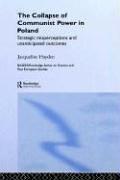| Listing 1 - 4 of 4 |
Sort by
|
Book
ISBN: 271680012X Year: 1982 Volume: 359. Publisher: Paryż Instytut literacki
Abstract | Keywords | Export | Availability | Bookmark
 Loading...
Loading...Choose an application
- Reference Manager
- EndNote
- RefWorks (Direct export to RefWorks)
Polska Zjednoczona Partia Robotnicza --- -Polnische Vereinigte Arbeiterpartei --- Polish United Workers Party --- PZPR --- Polʹskai︠a︡ obʺedinennai︠a︡ rabochai︠a︡ partii︠a︡ --- PORP --- United Polish Workers' Party --- UPWP --- Parti ouvrier unifié polonais --- PVAP --- P.Z.P.R. --- P.O.R.P. --- U.P.W.P. --- P.V.A.P. --- Heniaion Ergatikon Komma tēs Polōnias --- Partido Operário Unificado Polonês --- POUP --- Polish Communist Party --- PUWP --- Polska Partia Socjalistyczna --- Polska Partia Robotnicza --- Socjaldemokracja Rzeczypospolitej Polskiej --- Party work --- Poland --- Trials (Political crimes and offenses) --- -Politics and government --- -Polska Zjednoczona Partia Robotnicza --- -Party work --- Polnische Vereinigte Arbeiterpartei --- Party work. --- Politics and government
Book
ISBN: 052124269X 0521070279 0511895801 Year: 1982 Publisher: Cambridge : Cambridge University Press,
Abstract | Keywords | Export | Availability | Bookmark
 Loading...
Loading...Choose an application
- Reference Manager
- EndNote
- RefWorks (Direct export to RefWorks)
In this book Dr Woodall analyses the political implications of the pursuit of industrial growth for the authority of the Polish United Workers' Party. She argues that political constraints on the available options for economic reform have encouraged a policy of merger of industrial enterprises into large `corporate' units since 1958. Although they are only a shadow of their Western counterparts, these socialist corporations' nevertheless pose considerable problems for the role of a Marxist-Leninist party in industry. While this does not manifest itself in the emergence of a clearly identifiable 'technocratic' class of managers challenging the legitimacy of the Party, it does involve difficulties caused by an increasingly 'technicist' ethos of industrial management which eschews the possibility of meaningful workforce participation. Dr Woodall thus shows how the over-zealous pursuit of industrial integration and concentration in the 1970s was, despite attempts by the Polish United Workers' Party to reformulate its 'leading role', one of the major factors contributing to the industrial unrest which brought about the fall of the Gierek leadership in 1980.
Economic order --- Poland --- Social Sciences --- Political Science --- Industrial organization --- Manpower policy --- Working class --- History --- Polska Zjednoczona Partia Robotnicza. --- Commons (Social order) --- Labor and laboring classes --- Laboring class --- Labouring class --- Working classes --- Social classes --- Labor --- Employment --- Polnische Vereinigte Arbeiterpartei --- Polish United Workers Party --- PZPR --- Polʹskai︠a︡ obʺedinennai︠a︡ rabochai︠a︡ partii︠a︡ --- PORP --- United Polish Workers' Party --- UPWP --- Parti ouvrier unifié polonais --- PVAP --- P.Z.P.R. --- P.O.R.P. --- U.P.W.P. --- P.V.A.P. --- Heniaion Ergatikon Komma tēs Polōnias --- Partido Operário Unificado Polonês --- POUP --- Polish Communist Party --- PUWP --- Polska Partia Socjalistyczna --- Polska Partia Robotnicza --- Socjaldemokracja Rzeczypospolitej Polskiej
Book
ISBN: 023106540X Year: 1987 Publisher: New York Columbia University Press
Abstract | Keywords | Export | Availability | Bookmark
 Loading...
Loading...Choose an application
- Reference Manager
- EndNote
- RefWorks (Direct export to RefWorks)
Political parties --- Poland --- 943.8.09 --- Polska Zjednoczona Partia Robotnicza --- Polnische Vereinigte Arbeiterpartei --- Polish United Workers Party --- PZPR --- Polʹskai︠a︡ obʺedinennai︠a︡ rabochai︠a︡ partii︠a︡ --- PORP --- United Polish Workers' Party --- UPWP --- Parti ouvrier unifié polonais --- PVAP --- P.Z.P.R. --- P.O.R.P. --- U.P.W.P. --- P.V.A.P. --- Heniaion Ergatikon Komma tēs Polōnias --- Partido Operário Unificado Polonês --- POUP --- Polish Communist Party --- PUWP --- Polska Partia Socjalistyczna --- Polska Partia Robotnicza --- Socjaldemokracja Rzeczypospolitej Polskiej --- Politics and government --- -943.8.09 --- -Political parties --- Polska Zjednoczona Partia Robotnicza.

ISBN: 9781134208012 1280377267 9786610377268 0203027760 1134208014 9780203027769 9781134207961 9781134208005 9780415368056 9780415674935 1134208006 0415368057 041567493X Year: 2017 Publisher: Abingdon, Oxon : Routledge,
Abstract | Keywords | Export | Availability | Bookmark
 Loading...
Loading...Choose an application
- Reference Manager
- EndNote
- RefWorks (Direct export to RefWorks)
Based on extensive original research, including interviews with key participants, this book investigates the sudden and unforeseen collapse of communist power in Poland in 1989. It sets out the sequence of events, and examines the strategies of the various political groupings prior to the partially free election of June 1989. This volume argues that the specific negotiating strategies adopted by the communist party representatives in the Round Table discussions before the elections was a key factor in communism's collapse. The book shows that on many occasions, PZPR decision-makers i
Polska Zjednoczona Partia Robotnicza. --- Poland --- Politics and government --- Polnische Vereinigte Arbeiterpartei --- Polish United Workers Party --- PZPR --- Polʹskai︠a︡ obʺedinennai︠a︡ rabochai︠a︡ partii︠a︡ --- PORP --- United Polish Workers' Party --- UPWP --- Parti ouvrier unifié polonais --- PVAP --- P.Z.P.R. --- P.O.R.P. --- U.P.W.P. --- P.V.A.P. --- Heniaion Ergatikon Komma tēs Polōnias --- Partido Operário Unificado Polonês --- POUP --- Polish Communist Party --- PUWP --- Polska Partia Socjalistyczna --- Polska Partia Robotnicza --- Socjaldemokracja Rzeczypospolitej Polskiej --- Regional studies --- European history --- Ethnic studies --- Political ideologies --- Marxism & Communism --- round --- table --- process --- jerzy --- wiatr --- janusz --- reykowski --- przeworskis --- hypothesis --- party
| Listing 1 - 4 of 4 |
Sort by
|

 Search
Search Feedback
Feedback About UniCat
About UniCat  Help
Help News
News